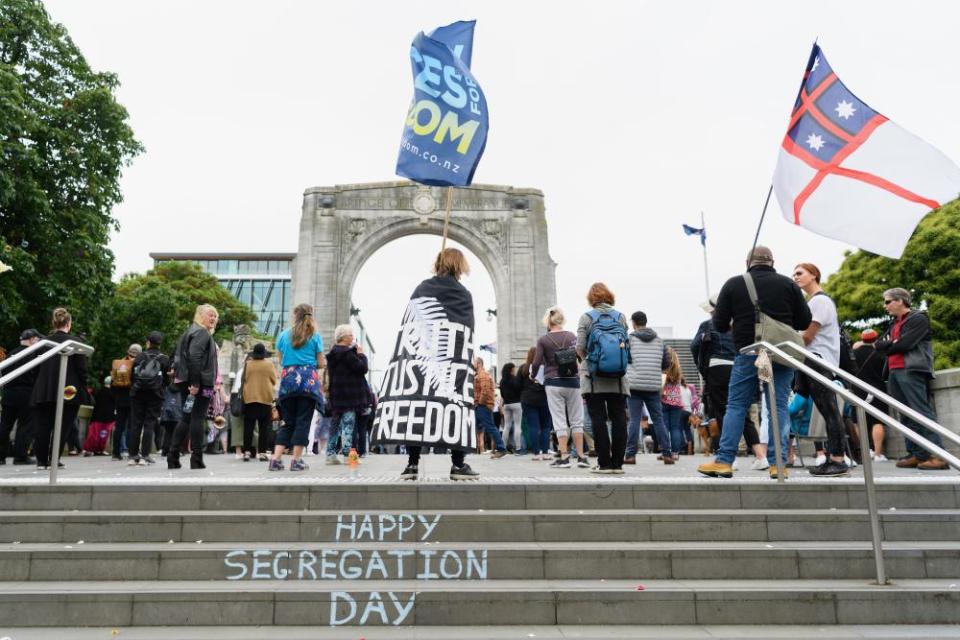New Zealand anti-vax group urges supporters to stand for councils and ‘throw weight around’

An anti-vaccine group that was involved in the weeks-long occupation at parliament this year has called on its supporters to take up positions in New Zealand’s local government so they can “throw their weight around”.
The Voices for Freedom group was one of many affiliated with the February protest that was nominally about the government’s vaccine-mandate rules, but which reflected an extensive list of complaints, including QAnon-style conspiracies and vaccine-scepticism.
Now, its leaders want its supporters to throw their hats in the ring to become local representatives. According to Dr Mona Krewel, a political scientist who has studied Voices For Freedom, and a report in Stuff, the organisation has emailed potential candidates suggesting they hide their affiliation to the group in candidate paperwork. Guardian Australia has contacted the group for comment on this point.
Local body elections take place in October but the cut-off date for nominations was last week. Prior to the cut-off, Local Government New Zealand (LGNZ) put out an “SOS for local democracy”, after some councils reported they had not received enough nominations to fill their chambers, and that key roles would remain empty or uncontested.
Related: ‘So many rabbit holes’: Even in trusting New Zealand, protests show fringe beliefs can flourish
Voices for Freedom has told its members, via messaging platforms such as Telegram, to seize the opportunity. Some members have confirmed their bids, including including Jaspreet Boparai, a vocal member of the group.
During a Webinar this month, member Tane Webster urged supporters to get involved: “When we have a whole lot of energised, motivated people, we can really sway the results, throw our weight around.”
Voices for Freedom is a sophisticated, motivated group that openly stands for conspiratorial beliefs and spreads misinformation and disinformation, said Dr Sanjana Hattotuwa, an extremism specialist at research centre Te Pūnaha Matatini.
Hattotuwa has concerns about the group’s attempts to enter local politics. “Is it really worrying what they will go on to do, the thinking that they are bringing and the consequence of getting into local government. We need to take this very seriously.”
“It is a powerful way of expanding their role, strengthening their imprint, entrenching their ideology, expanding their network and ensuring that over a period of time some of our social mindset will change.”
Hattotuwa said everyone should be able to participate in democracy and stand for local government, but in this case, he was concerned at reports the group was suggesting its members conceal their affiliations when entering the ring.
Krewel described the group’s ideology and proliferation of disinformation as potentially “dangerous”.
“I would characterise them as a real threat if they run in local elections,” Krewel said.
The group is using the elections to escalate its influence, she said.
“There is actually a lot to decide at the local level – as turnout is low and there is not much competition in this election, they actually stand a real chance to be elected and given a platform in the coming years.”
Krewel said the horse had bolted with Voices for Freedom members having already thrown their hats in the ring – now it was up to voters to do their homework.
“It is their democratic right to run, but it’s also the voters’ democratic rights to inform themselves and in particular their civic duty – even more so – before they vote for someone.”
Guardian Australia has contacted Voices of Freedom for further comment.

 Yahoo Movies
Yahoo Movies 